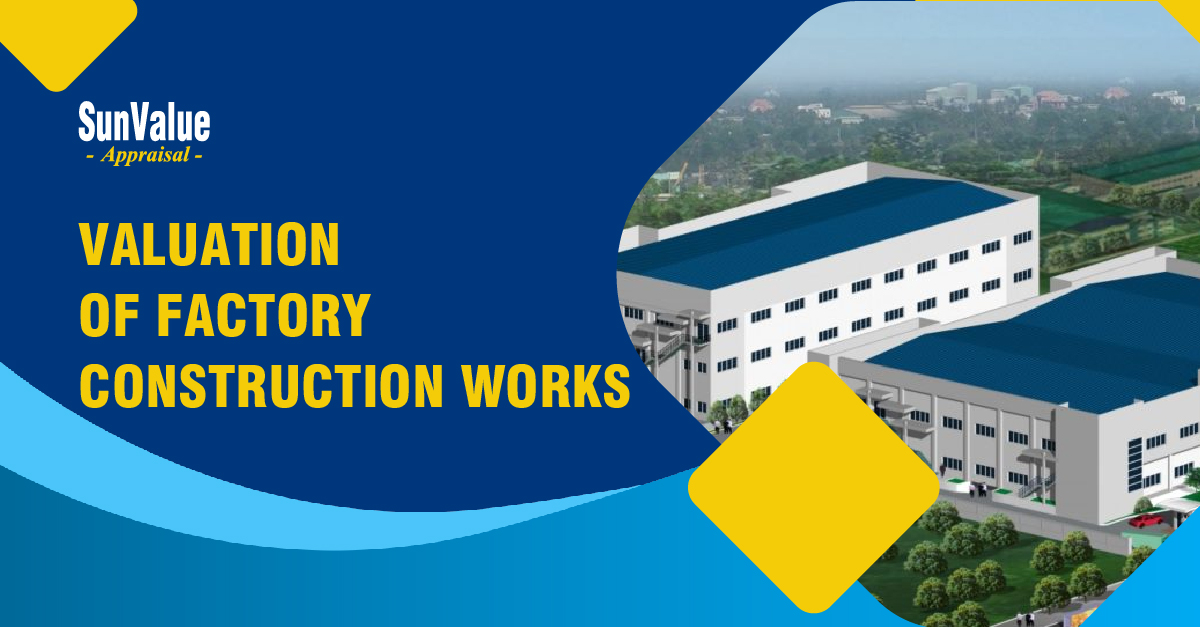Workshops, manufacturing plants, construction works, etc. are common assets of businesses and companies operating in the fields of production, logistics, e-commerce, etc. Valuation of factories and constructions. construction, etc. is a popular activity in the field of enterprise valuation to meet the following purposes: mortgage loans, contribute investment capital, prove financial capacity...
I. What is a workshop?
A factory, factory or w, or warehouse is a type of industrial building, with an area - capacity on a larger scale than a normal house, shop, or office. Workshops and factories are places where a large number of workers are concentrated or machines, production lines, and input materials serve a certain production process of an enterprise.
Because they are not designed to live in, factories, factories, and warehouses have their specific characteristics in terms of design and ancillary infrastructure such as electricity, water, fire protection, waste treatment, communication, etc. wind…
Types of factories and production plants
The classification of factories, production plants, and warehouses is done based on many different angles such as usability, technical characteristics - construction materials, construction area...
Classification of Workshops according to specifications and construction materials includes:
• Steel truss factory, also known as a pre-engineered factory: Unlike the reinforced concrete factory, the pre-engineered factory is built entirely with a steel structure. Specifically: All columns, beams, and beams are made of steel trusses. The foundation is still concrete and reinforced. The standard thickness of the brick wall is still 10-20cm, 2.2-2.8m high. Parts of walls from 2.8m or more can be used to form partitions depending on the design of the factory. The roof of the factory is made of steel truss using specialized corrugated iron for insulation.
• Concrete and reinforced concrete workshops: This is a relatively common type of workshop and has been used for a long time. The entire factory is poured with reinforced concrete from the foundation, columns, and beams. The wall is built of bricks or unburnt materials, the thickness depends on the design. The roof is made of galvanized sheets with heat-insulating, fire-proof and noise-proof stickers. This type of workshop uses black or galvanized purlins.
Classification of factories by function, the purpose of use:
• Factory without an office: This type of factory mainly consists of workers, and machinery lines to ensure production purposes, and to create finished products such as consumer goods, mechanical, electronic, and food production. products, cosmetics…
• Factory combined with office: This type of factory is divided into 2 functional areas: production workshop and office. The construction of factories, factories combined with offices will bring businesses a lot of benefits such as: Saving investment costs by taking advantage of the combined factory area as an office; Helping businesses be more flexible in the operation process; Suitable for small and medium businesses.
Classification of factories and factories on demand: Workshops according to specific requirements of enterprises to serve activities and production in specific industries. With the type of factory and warehouse on demand, it will help reduce investment costs, optimize usage, and quickly build time, suitable to the financial situation of each business.

II. What is construction?
Construction works are products created by human labor, construction materials, and equipment installed in the works, linked and positioned with the soil, which may include the underground part and the upper part. ground, below water, and above water, built according to design. Construction works include civil, industrial, traffic, agriculture, rural development, technical infrastructure, and other works.
Classification of construction works:
According to Decree 46/2015 ND-CP of the Government, construction works will be classified into the following categories:
Civil works: including houses and public works
• Housing includes condominiums and individual houses
• Public works include cultural works; education projects; medical works; commercial and service works; working houses; hotels, guest houses; traffic service houses; houses serving telecommunications, radio, and television broadcasting towers; train stations, bus stations; sports facilities of all kinds.
Industrial works include coal and ore mining works; oil and gas exploitation works; chemical and petrochemical works; works for petrol, oil, liquefied petroleum gas and gas and oil distribution pipelines; metallurgical works; mechanical works, manufacturing; electronic-informatics industrial works; energy works; light industrial works; food industry works; construction material industrial works; production works and warehouses for industrial explosives.
Traffic works include road works; railway works; waterway works; bridges; tunnels; airports.
Irrigation works include water reservoirs; dams; drains; pump stations; well; water pipe; channel; works on canals and embankments of all kinds.
- • Buying, selling, transferring.
- • Bank loans.
- • Joint ventures.
- • Equitization and establishment of enterprises.
- • Debt settlement, business dissolution.
- • Compensation, insurance, claims.
- • Accounting, tax calculation.
- • Consulting and making investment projects.
- • Decision approving investment project
- • Decision approving total investment
- • Decision approving the cost estimate
- • Feasibility study report, feasibility progress
- • Construction design drawing documents
- • Project costing documents
- • Dossier of acceptance of each phase, full acceptance (if any)
- • As-built drawing (if any)
- • Project settlement documents
- • Minutes, and other relevant records.
- One is the percentage (%) multiplied by the total value of that factory (after preliminary) plus incurred costs such as the working trip, the testing fee (if any), value added tax.
- The second is a package appraisal fee as agreed between the enterprise and the appraisal company

